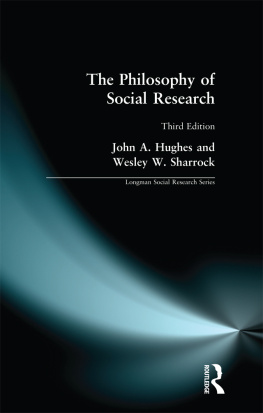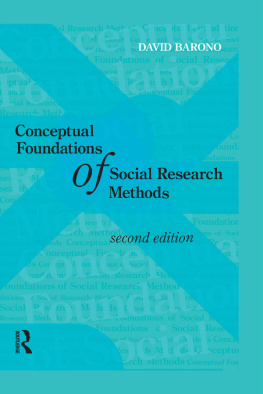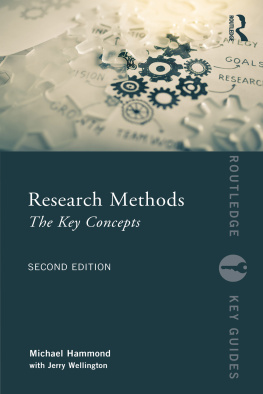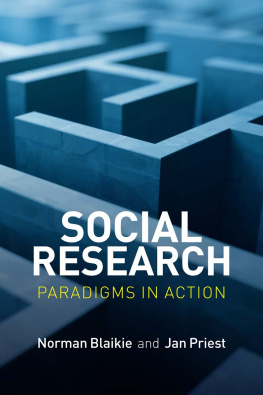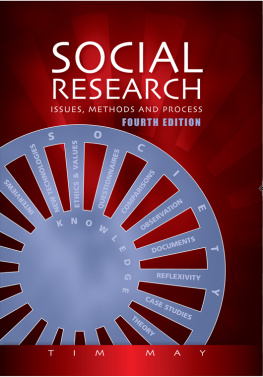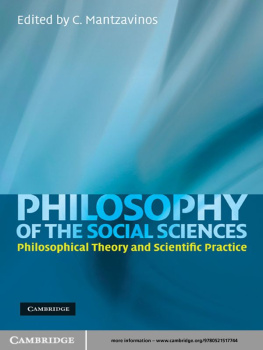THE PHILOSOPHY OF SOCIAL RESEARCH
Longman Social Research Series
Series Editor: Professor Maurice Craft, Goldsmiths' College,
University of London.
Reading Ethnographic Research, 2nd edition
Martyn Hammersley
The Philosophy of Social Research, 3rd edition
John A. Hughes and Wesley W. Sharrock
The Limitations of Social Research, 4th edition
Marten Shiprnan
LONGMAN SOCIAL RESEARCH SERIES
The Philosophy of Social Research
John A. Hughes
Wesley W. Sharrock
Third Edition
First published 1980 by Pearson Education Malaysia
Second edition 1990
Third edition 1997
Published 2014 by Routledge
2 Park Square, Milton Park, Abingdon, Oxon OX14 4RN
711 Third Avenue, New York, NY 10017, USA
Routledge is an imprint of the Taylor & Francis Group, an informa business
Copyright 1990, 1997, Taylor & Francis.
The right of John A. Hughes and Wesley W. Sharrock to be identified as authors of this work has been asserted by them in accordance with the Copyright, Designs and Patents Act 1988.
All rights reserved. No part of this book may be reprinted or reproduced or utilised in any form or by any electronic, mechanical, or other means, now known or hereafter invented, including photocopying and recording, or in any information storage or retrieval system, without permission in writing from the publishers.
Notices
Knowledge and best practice in this field are constantly changing. As new research and experience broaden our understanding, changes in research methods, professional practices, or medical treatment may become necessary.
Practitioners and researchers must always rely on their own experience and knowledge in evaluating and using any information, methods, compounds, or experiments described herein. In using such information or methods they should be mindful of their own safety and the safety of others, including parties for whom they have a professional responsibility.
To the fullest extent of the law, neither the Publisher nor the authors, contributors, or editors, assume any liability for any injury and/or damage to persons or property as a matter of products liability, negligence or otherwise, or from any use or operation of any methods, products, instructions, or ideas contained in the material herein.
ISBN 13: 978-0-582-31105-3 (pbk)
British Library Cataloguing-in-Publication Data
A catalogue record for this book is available from the British Library
Library of Congress Cataloging-in-Publication Data
Hughes, J. A., 1941
The philosophy of social research / John A. Hughes, Wesley W.
Sharrock. 3rd ed.
p. cm. (Longman social research series)
Includes bibliographical references and index.
ISBN 0-582-31105-5 (pbk.)
1. Social sciencesResearchMethodology. I. Sharrock, W. W.
(Wes W.) II. Title. III. Series.
H61.H88 1997
306'.72dc21 97-28440
CIP
Set by 35 in 10/11pt Times
This third edition has been considerably revised in the following ways. First, by inviting Wes Sharrock as co-author. Wes and I have been working together on a variety of projects for a number of years and this third edition would not have been even feasible without his wise and considerable participation. Second, it includes expositions of serious gaps in the second edition, mainly Foucault, Derrida and the post-empiricist efforts to sustain the spirit of positivism. The third, and one of the more important changes, has been in the book's structure. In effect, the review of the arguments now falls more clearly into two parts: the first dealing with positivism and the second examining a range of ideas which constitute reactions to positivism. The thread which runs through both is that of foundationalism and anti-foundationalism which helps to provide some thematic continuity to what can appear to be very different and unrelated issues. The text has been extensively revised throughout and includes two new chapters, both responding to the issues surrounding the foregrounding of language in social science. The conclusion, too, has been completely rewritten to give it an even more Wittgensteinian air.
As usual there are very many people to thank. Ulrik Petersen, an extremely intelligent and companionable politics graduate student from Denmark, has given much needed advice, support and stimulus as well as some serious liquid indulgence. Jon O'Brien and Mark Rouncefield have more than just held the fort while the book was being finished. Their lack of complaint is remarkable testimony to their generosity. Tom Rodden, as usual, has been an immensely generous colleague. Lou Armour, who wrote the best doctoral thesis that either of the authors have seen for many a year, was always insightful and freely giving of his time. Andrew Crabtree, Jenny Ball, Cal Giles, Jason Khan, John Allen, Preben Mogensen, Catherine Fletcher, Karen Gammon, Barry Sanderson and Chris Quinn are others who deserve a special mention for various facilities they have provided during the writing of this book.
CHAPTER 1
The philosophy of social research
Introduction
The relationship between philosophy and what we now refer to as the social sciences has a long history. Indeed, the social sciences have often envisaged themselves as following the natural sciences which originated by separating themselves from philosophy, with the social sciences appropriating as their scientific issues the last unsolved problems of philosophy. Unlike the natural sciences, the social sciences have not, for the most part, been able to dissociate themselves from philosophy. Although the social sciences vary in this respect, philosophical issues continually provide the fundamental questions these disciplines ask about the nature of their appropriate subject matters, their intellectual provenance, their investigative rationales, and above all about the nature of their valid and proper methods. Sociology, for example, seems to consist almost entirely of a succession of approaches and perspectives most of which bear a heavy philosophical tone and which have as their main focus a continuing struggle with philosophical problems, many of which are of nineteenth century origin. As we say, the social sciences vary in this regard, with sociology, perhaps, being the most salient case, existing in near perpetual crisis about its fundamental status and self-conception as a discipline. But, others are by no means exempt. It is common, for example, for training in political science to include courses in political theory, for economics to include the history of economic thought, both heavily philosophical, and for methodological training across the spectrum of the social sciences to include courses in philosophical ideas about appropriate methods predominantly organised under the aegis of the philosophy of science.
We note the involvement of the social sciences with philosophy not by way of complaint but simply to bring to attention the fact that philosophical issues remain of continuing concern in the social and the human sciences. What else this might indicate about their intellectual character is a matter of debate, but it is a central fact about their intellectual life. Nor is this surprising if we look at the formative influences. In sociology, for example, the founding trinity of Marx, Weber and Durkheim spent a considerable amount of their efforts establishing and refining the philosophical bases for their own ideas, the results of which still massively shape sociological debates, not least because of the For them, and this is still probably more typical of the European traditions of social science than it is of the American, philosophical questions had to be settled in advance of empirical enquiries. Given this heritage, and the immense difficulty of bringing philosophical controversies to any kind of conclusive resolution, purportedly fundamental questions at the heart of the human sciences remain unresolved and continually stimulate the necessity to remain engaged with philosophy.

